Yet another study has found that the Moderna COVID-19 vaccine may be more effective against infection that the Pfizer-BioNTech shot.
Researchers, led by the Centers for Disease Control and Prevention (CDC), compared the two vaccines in a real-world study of 5,000 healthcare workers in 25 states.
They found that the Moderna vaccine was 96 percent effective at preventing symptomatic cases of Covid while the Pfizer jab was 89 percent effective.
The findings add to a growing body of evidence that while both vaccines are still highly protective, one may be more so than the other – and could have impacts on the conversation surrounding booster shots.
Health experts have some theories about why there is a difference including that Moderna’s vaccine dose is larger and that the larger time period between two doses for the Moderna vaccine allow more time for immune cells and antibodies to be generated.
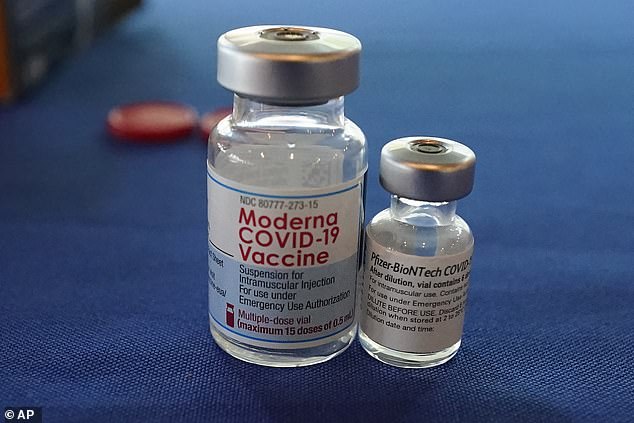
A new study led by the CDC compared 5,000 healthcare workers in 25 states who received either the Pfizer-BioNTech Covid vaccine or the Moderna vaccine
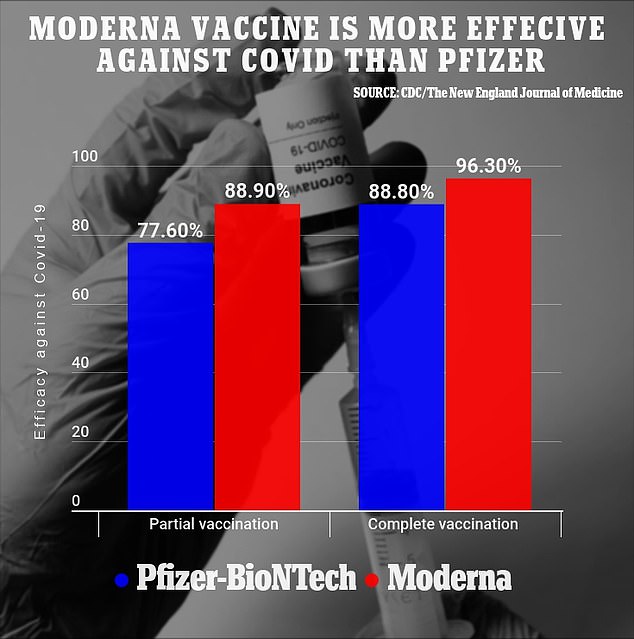
After two doses, the Moderna jab was 96.3% effective against symptomatic illness while the Pfizer shot was 88.9% effective – and the Moderna jab was also more effective after one dose
Since the vaccines were authorized by the U.S. Food and Drug Administration (FDA) in 2020, health officials and experts had that Americans received whichever one they could because they ere all just as effective against the virus.
Both, which use new messenger RNA (mRNA) technology, were found to be around 95 percent effective at preventing illness in clinical trial last year.
As of Thursday morning, 221.9 million people have received at least one dose of Pfizer and 150.2 million have gotten at least one dose of Moderna, CDC data show.
However, several studies released in the last month have shown over the last few months that while both are highly protective against Covid – one may be more protective than the other.
A Canadian study from August looking at long-term care home residents in Ontario found that four weeks after dose 2, seniors who received the Pfizer vaccine had 3.89-fold fewer neutralizing antibodies than those who received the Moderna jab.
Additionally, a Belgian study, also published last month, examining 1,600 workers at a major Belgium hospital system found that recipients of the Moderna shot had antibody levels 2.65 times higher than those given the Pfizer inoculation.
What’s more, a CDC report issued last week, found the Moderna vaccine was 93 percent effective against hospitalization compared to 88 percent for the Pfizer vaccine and 71 percent for the Johnson & Johnson jab.
The report also found that antibody levels in blood samples were highest among Moderna recipients in a separate group of healthy volunteers compared to levels for Pfizer and J&J recipients
The new study, published in The New England Journal of Medicine on Wednesday, is the latest to report similar findings.
‘Our baseline assumption is that the mRNA vaccines are functioning similarly, but then you start to see a separation,’ Dr Natalie Dean, a biostatistician at Emory University in Atlanta, told The New York Times.
‘It’s not a huge difference, but at least it’s consistent.’
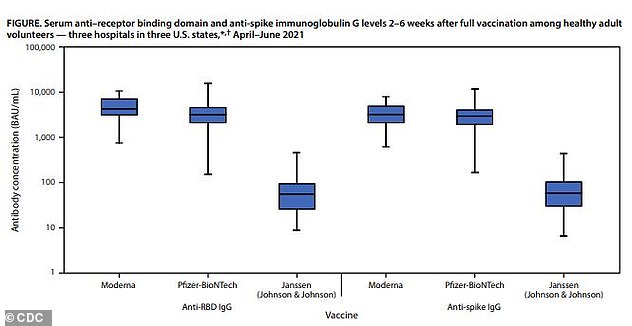
A CDC report last week looked at antibody levels in blood samples were highest among Moderna recipients in a separate group of healthy volunteers compared to levels for Pfizer and J&J recipients
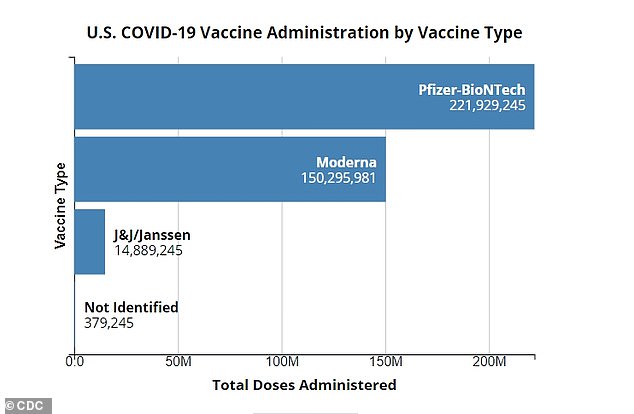
More than 221.9 million people have received at least one dose of Pfizer and 150.2 million have gotten at least one dose of Moderna
For the study, researchers looked at more than 5,000 healthcare workers in 25 states who were enrolled between December 28, 2020, and May 19, 2021.
Of the staff members, 1,482 had tested positive for COVID-19 with at least one symptom while the remaining 3,449 had tested negative.
Vaccine effectiveness was evaluated both after partial vaccination and after full vaccination, meaning 14 days after the second dose.
After one dose, the Pfizer vaccine was 77.6 percent effective against symptomatic infection while the Moderna vaccine was 88.8 percent effective.
After both doses, Pfizer’s shot was 88.9 percent effective while the Moderna jab was 96.3 percent effective.
These rates were comparable regardless of age, race, sex, or having pre-existing conditions.
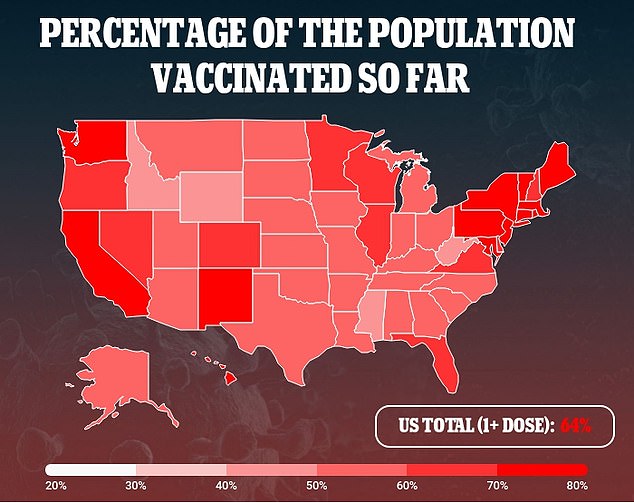
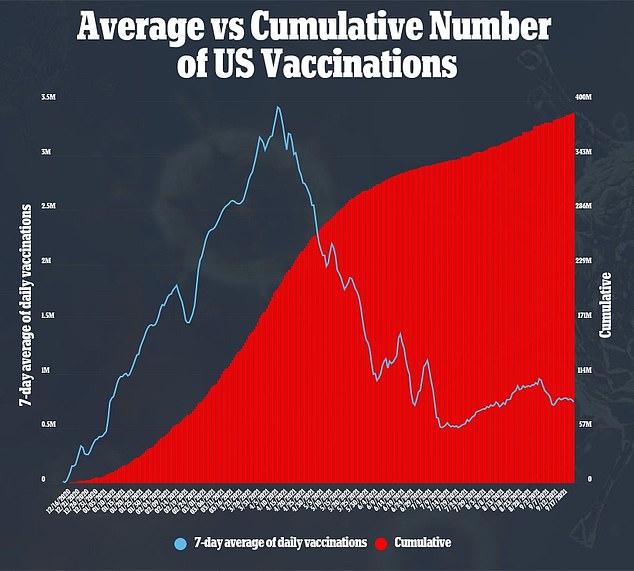
There are some theories about why there is a difference.
One theory is that one dose of the Moderna vaccine is 100 micrograms (μg) compared to 30 μg for Pfizer.
Another is that because four weeks pass between the two Moderna shots compared to three weeks for the two Pfizer shots, it may allow more time for antibodies to generate.
‘At the end of the day, I do think there are subtle but real differences between Moderna and Pfizer,’ Dr Jeffrey Wilson, an immunologist at the University of Virginia in Charlottesville, who was not involved in the study, told The Times.
‘In high-risk populations, it might be relevant. It’d be good if people took a close look. Pfizer is a big hammer, but Moderna is a sledgehammer.’
If more studies continue to show similar findings, there may be impacts the conversation surrounding booster shots.
On Wednesday evening, a third dose of the Pfizer vaccine was approved by the FDA for those aged 65 and older and those at high risk of severe illness.
Moderna has submitted data to the FDA on its booster shot and is waiting for officials to review the application.

Source link : https://www.dailymail.co.uk/health/article-10021541/Moderna-vaccine-effective-against-COVID-19-infection-96-compared-Pfizer-shot-89.html











